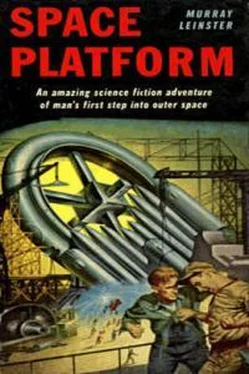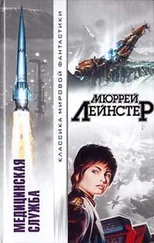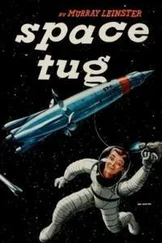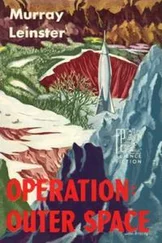Gloating over the solution he'd found, Joe could have hugged himself. Hanging to a strap in the waiting bus, he saw another bus start off with a grinding of gears and a spouting of exhaust smoke. It trundled to the highway and rolled away. Another and another followed it. Joe's bus fell in line. They headed for Bootstrap in a convoy, a long, long string of lighted vehicles running one behind the other.
It was dark outside. The Shed was alone, for security. It was twenty miles from the town where its work force slept and ate and made merry. That was security too. One shift came off, and went through a security check, and during that time the Shed was empty save for the security officers who roamed it endlessly, looking for trouble. Sometimes they found it. The shift coming on also passed through a security check. Nobody could get into the Shed without being identified past question. The picture–badge stage was long since passed on the Space Platform job. Security was tight!
The long procession of busses rolled through the night. Outside was dark desert. Overhead were many stars. Inside the jammed bus were swaying figures crowded in the aisle, and every seat was filled. There was the smell of sweat, and oil, and tobacco. Somebody still had garlic on his breath from lunch. There was the noise of many voices. There was an argument two seats up the aisle. There was the rumble of the motor, and the peculiar whine of spinning tires. Men had to raise their voices to be heard above the din.
A swaying among the crowded figures more pronounced than that caused by the motion of the bus caught Joe's eye. Somebody was crowding his way from the back toward the front. The aisle was narrow. Joe clung to his strap, thinking hard and happily about the rebalancing of the gyros. There could be no tolerance. It had to be exact. There had to be no vibration at all….
Figures swayed away from him. A hand on his shoulder.
"Hiya."
He swung around. It was the lean man, Haney, whom he'd kept from being knocked off the level place two hundred feet up.
Joe said: "Hello."
"I thought you were big brass," said Haney, rumbling in his ear. "But big brass don't ride the busses."
"I'm going in to try to hunt up the Chief," said Joe.
Haney grunted. He looked estimatingly at Joe. His glance fell to Joe's hands. Joe had been digging further into the crates, and afterward he'd washed up, but packing grease is hard to get off. When mixed with soot and charcoal it leaves signs. Haney relaxed.
"We mostly eat together," he observed, satisfied that Joe was regular because his hands weren't soft and because mechanic's soap had done an incomplete job on them. "The Chief's a good guy. Join us?"
"Sure!" said Joe. "And thanks."
A brittle voice sounded somewhere around Haney's knees. Joe looked down, startled. The midget he'd seen up on the Platform nodded up at him. He'd squirmed through the press in Haney's wake. He seemed to bristle a little out of pure habit. Joe made room for him.
"I'm okay," said the midget pugnaciously.
Haney made a formal introduction.
"Mike Scandia." He thumbed at Joe. "Joe Kenmore. He's eating with us. Wants to find the Chief."
There had been no reference to the risk Joe had run in keeping Haney from a two–hundred–foot fall. But now Haney said approvingly: "I wanted to say thanks anyhow for keeping your mouth shut. New here?"
Joe nodded. The noise in the bus made any sort of talk difficult. Haney appeared used to it.
"Saw you with—uh—Major Holt's daughter," he observed again. "That's why I thought you were brass. Figured one or the other'd tell on Braun. You didn't, or somebody'd've raised Cain. But I'll handle it."
Braun would be the man Haney had been fighting. If Haney wanted to handle it his way, it was naturally none of Joe's business. He said nothing.
"Braun's a good guy," said Haney. "Crazy, that's all. He picked that fight. Picked it! Up there! Coulda been him knocked off—and I'd ha' been in a mess! I'll see him tonight."
The midget said something biting in his peculiarly cracked and brittle voice.
The bus rolled and rolled and rolled. It was a long twenty miles to Bootstrap. The desert outside the bus windows was utterly black and featureless, but once a convoy of trucks passed, going to the Shed.
Presently, though, lights twinkled in the night. Again the bus slowed, in column with the others. Then there were barrackslike buildings, succeeding each other, and then there was a corner and suddenly the outside was ablaze with light. The busses drew up to the curb and stopped, and everybody was immediately in a great hurry to get out, shoving unnecessarily, and Joe let himself be carried along by the crowd.
He found himself on the sidewalk with bright neon signs up and down the street. He was in the midst of the crowd which was the middle shift released. It eddied and dispersed without seeming to lessen. Most of the figures in sight were men. There were very, very few women. The neon signs proclaimed that here one could buy beer, and that this was Fred's Place, and that was Sid's Steak Joint. Bowling. Pool. A store—still open for this shift's trade—sold fancy shirts and strictly practical work clothes and highly eccentric items of personal adornment. A movie house. A second. A third. Somewhere a record shop fed repetitious music to the night air. There was movement and crowding and jostling, but the middle of the street was almost empty save for the busses. There were some bicycles, but practically no other wheeled traffic. After all, Bootstrap was strictly a security town. A man could leave whenever he chose, but there were formalities, and personal cars weren't practical.
"Chief'll be yonder," said Haney in Joe's ear. "Come along."
They shouldered their way along the sidewalk. The passers–by were of a type—construction men. Somebody here had taken part in the building of every skyscraper and bridge and dam put up in Joe's lifetime. They could have been kept away from the Space Platform job only by a flat refusal by security to let them be hired.
Haney and Joe moved toward Sid's Steak Joint, with Mike the midget marching truculently between them. Men nodded to them as they passed. Joe marshaled in his mind what he was going to tell the Chief. He had a trick for fixing the pilot gyros. A speck of rust would spoil them, and they had been through a plane crash and a fire and explosions, but his trick would do, in ten days or less, what the plant back home had needed four months to accomplish. The trick was something to gloat over.
Into Sid's Steak Joint. A juke box was playing. Over in a booth, four men ate hungrily, with a slot TV machine in the wall beside them showing wrestling matches out in San Francisco. A waiter carried a huge tray from which steam and fragrant odors arose.
There was the Chief, dark and saturnine to look at, with his straight black hair gleaming in the light. He was a Mohawk, and he and his tribe had taken to steel construction work a long time back. They were good. There were not many big construction jobs on which the Chief's tribesmen were not to be found working. Forty of them had died together in the worst construction accident in history, when a bridge on its way to completion collapsed in the making, but there were a dozen or more at work on the Space Platform now. The Chief had essayed machine–tool work at the Kenmore plant, and he'd been good. He'd pitched on the plant baseball team, and he'd sung bass in the church choir, but there had been nobody else around who talked Indian, and he'd gotten lonely. At that, though, he'd left because the Space Platform began and wild horses couldn't have kept him away from a job like that!
He'd held a table for Haney and Mike, but his eyes widened when he saw Joe. Then he grinned and almost upset the table to stand up and greet him.
Читать дальше






